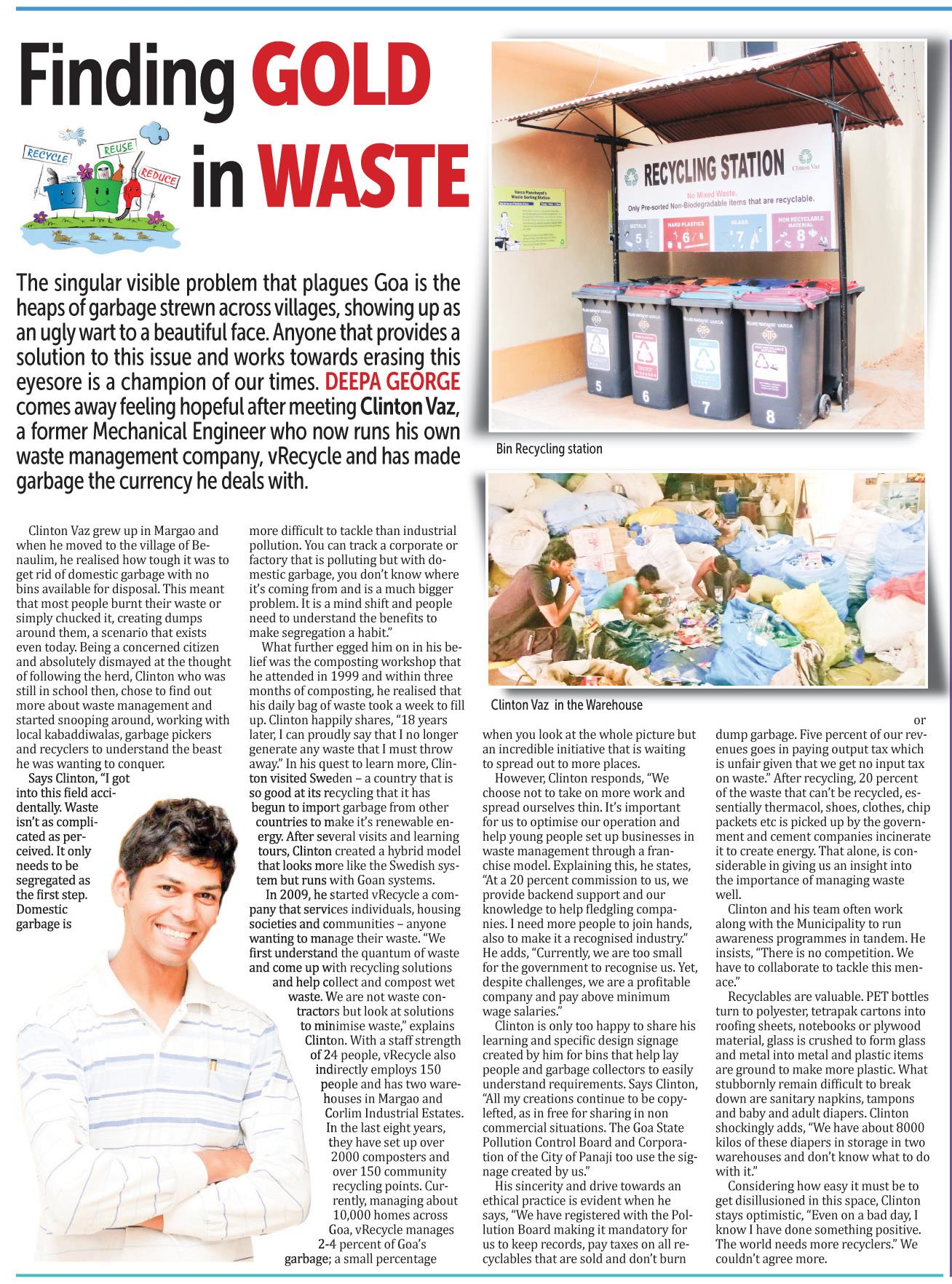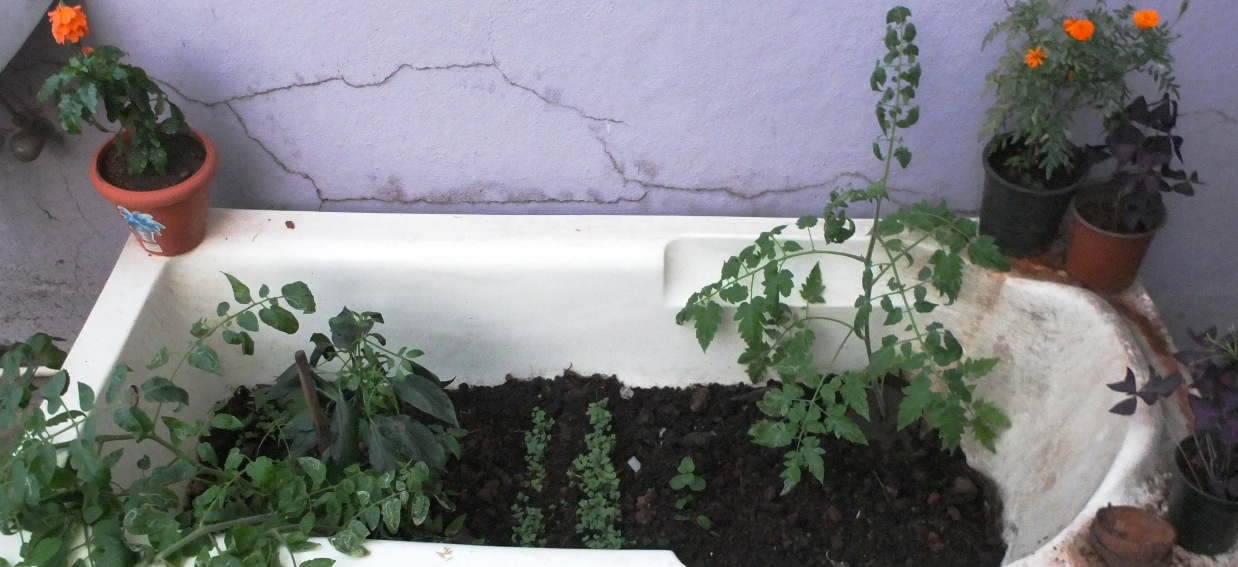
Composting
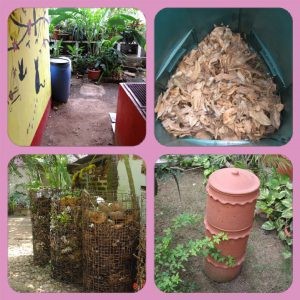
Nature recycles everything – do you! Its only human species on this earth, which has created loads of unsurmountable non bio degradable waste. Anyway, here let us take care of what can be decomposed, i.e. all bio degradable waste!
In words of Clinton Vaz, highly specialised in the matters of Composting & Recycling, says: “Worldwide, composting is an increasing trend. Over the last decade, western countries like the US and Canada have begun to realize that their landfill sites are filling up faster than they anticipated. This is cause for concern, as finding and setting up new landfill sites is expensive as well as problematic. Redirecting organic waste from landfill to composting is one solution to this problem.”
Therefore, its duty of each individual to take care of own waste as much as possible. Here we explain how some of us have been practicing it for years already and inspiring others to follow the suit. It makes life simpler too, not having to depend on someone else, besides getting some manure for home garden!! Perfect win win situation!
ABC of Composting by Clinton Vaz of VRecycle (appeared in Goan Newspaper)
Wet waste or Organic waste comprises of about 50% of the total waste that an average Goan family generates. Composting is one of the easiest ways to take care of this waste fraction. Just imagine, if everybody just composted their organic waste, we would have been able to reduce Goa’s garbage crisis by half!
Download Composting Tips from Clinton (PDF, 5 MB)
Composting is a natural process of converting your organic waste into a soil nutrient. In a very simple process, natural and harmless micro-organisms convert organic material such as leaves, paper, and food waste into a soil like material called compost.
Composting requires three main ingredients: Air, Moisture and Bacterial culture /micro organisms to work without any problems whatsoever. All these three ingredients are found locally, including the bacteria and microscopic organisms that live all around us. Bacteria are the prime decomposers in a compost heap and they arrive on every single piece of organic matter. Composting merely controls the conditions so that materials decompose faster.
Compost is quite different from the material that it was originally made from. Once waste has turned to compost, it has no unpleasant odours, is easy to handle and stores for long periods of time. It is a natural plant food, soil conditioner and can even be used as mulch for tree rooting in organic plantations. An added advantage is that compost fed gardens have more organic matter to the soil, increasing the soil life and encouraging earthworm populations to grow. Therefore, composting provides the garden with an inexpensive and excellent material to enrich the soil.
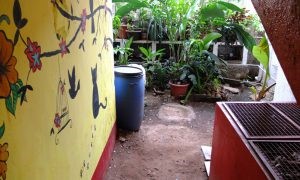
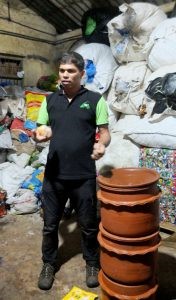
Environmentally too, composting makes good sense. It is a simple, efficient and natural way to recycle your kitchen and garden waste materials. It is cheaper than taking these materials to a municipal collection station or causing air pollution from burning garden waste. Compost spread on the soil surface improves soil texture, structure and fertility. It also helps loosen up sandy or clay soils, helps plant growth with major and minor plant nutrients plus trace elements essential for plant growth which chemical fertilizers try to duplicate. It’s great fun as well as participating in an action that helps to create a better future for us all.
What Can You Compost?
Vegetable and fruit peels, kitchen scraps, egg shells, bread, tea leaves, coffee grounds, waste food, human hair & pet fur, soft garden debris, lawn clippings, Paper, sawdust, straw, leaves, cardboard boxes, cardboard, napkins, tree clippings, woody material such as cabbage stalks. My experience has shown that both kitchen and garden material will compost much quicker when chipped, chopped or crushed into smaller pieces. Napkins, paper, and cardboard are best ripped into small pieces and soaked in water prior to composting.
What to Reduce In Your Compost
Meat, fish, fats, milk products, used cooking oil are best avoided in extremely large quantities as it may then create odour and fly problems. These items could still be put in your compost in small amounts, while taking necessary precautions, but as an alternative, meat & fish could be given to your pets or a nearby Animal shelter.
Coconut Shells, Wood, Big Bones are all compostable but take much longer to break down to compost. If you compost these items, be prepared to see them breakdown into smaller bits only after 3-6months of composting.
Avoid plant foliage that has residue of chemical sprays, especially hormone type weed killers & toxic material in general as this would contaminate your compost & kill the micro-organisms. Use organic sprays instead of chemicals and you would not have to bother about any contamination.
Vermicomposting
Vermicomposting is a technique of composting that uses earthworms to get more refined compost. However, vermicomposting requires one to first compost the waste and then introduce the earthworms, and therefore knowledge of plain composting is necessary before one begins to produce vermicompost.
While vermicomposting does produce better quality compost, it requires special ‘waste eating’ worms such as Eudrilus eugenia (African Night Crawler) and Isenia fetida (Red Wrigglers) as our Goan earthworms seem to be much more susegado, producing vermicompost slower. One also requires specially designed containers that keep the worms safe from sunlight and predators such as ants or rodents. My advice to first timers would be that simple aerobic composting is much easier to learn before they try out vermicomposting as their waste has to be pre-composted anyway. In General, the Vermicomposting technique of composting requires more attention.
Important points to keep in mind for successful composting
- You first need to decide what kind of composter, it can be a big plastic bucket with lot of holes for aeration or a rectangular / triangular bigger containers or a concrete chamber with several holes again and excess water outlet
- First we need to prepare a base for it with some ready compost, brown fibrous material (like coconut shells), wood shaving, dry leaves and to kick start the process, fresh cow dung
- Please put all your green / wet / kitchen / bio degradable waste in the bin, strictly NOT using any plastic liner or bag. After emptying, bin can be washed with tap water using the soft coconut fibre. Also ensure there is no plastic or non bio degradable items in the waste
- Paper is fine, as long as they are broken into small pieces and not as a lump or ball, but try to avoid putting newspaper due to chemical in form of printing, etc. Don’t put packaging paper which has thin plastic layer
- Humidity level plays very important role, it should just be moist with no liquid seeping out or collecting at the base
- Cooked food can also be put along with the waste, so can be meat waste (chicken, fish, prawn, etc), even tea leaves. But largely avoid milk product, lot of oil or milk based stuff
- If ever you have any foul smell coming, this may be due to waste not getting mixed properly with browns / lump is formed where there is no aeration / there is excess moisture not allowing aeration. Then you need to mix more of dry brown waste and churn it
- One can use a bottle of EM (Effective Microbe) solution, if available, It should be diluted in water and just sprayed over, helps accelerate the process. But its not a must to use it
- Do keep stored separately: the brown leaves (dry or even wet / moist); wood shavings (saw dust), etc and mix them each time with the new waste coming into the chamber. Even mud from garden can be used in small quantity to sprinkle over. You can source the dry rice hay or used up mycelium laced lump after mushroom has been grown. Amount of brown should be 2-3 times the green waste and it helps give balanced nutrition to the compost (brown for carbon and greens for nitrogen)
- Preferably mix the saw dust / brown leaves, already in your green bin, while waste is in the kitchen…so the process begins there itself
- Avoid placing (unless cut into small pieces),big peels (like jackfruit), hard inner shell of coconut, branches of tree. Outer coconut shell with thick coir is best placed at the base of composting chamber, which will absorb excess moisture
- In a couple of days, you will notice, the waste has turned hot (from inside, when you will dig into it a bit), that is very natural and indicates its working fine
- There will be maggots and several other creatures working silently inside, they are all needed and are not visible, unless the mass becomes too wet
- At least twice a week, proper churning of entire lot will be good. While doing so, you will experience some smell. However, after churning, again place a layer of brown over it and then it will be fine
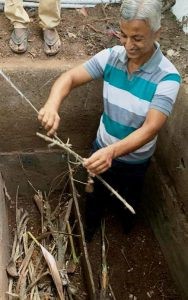
Recycling: How we manage our Waste
We at India Invites have always practiced 5 R’s of environment: Refuse, Reduce, Reuse, Repair and Recycle!
Refuse: One of the easiest ways to reduce waste is to stop collecting things not needed or freebies! Refuse it right away
Reduce: We must reduce our consumption as people tend to buy extra hoping that this would come in handy! Also as a responsible consumer, we should make noise against excessive / unnecessary packaging and boycott such products.
Reuse: We try to reuse same old stuff as long as it can not be used at all
Repair: Try to repair the thing not working well, rather than buying it altogether new (even if sometimes buying fresh item falls cheaper), as that also offers job to the workers and creates less waste on earth
Recycle: As a last option, if something really can not be reused, we should have the stuff recycled by storing them in segregated manner. It consumes lot of energy to recycle and a few things can not be recycled anymore after a few times. Of course recycling business can fetch a lot of money too!
We all have responsibility towards our eco-system and surrounding, as our very survival depends on that.
Useful Links (mostly Goa centric) on Waste Management & Composting Solutions
Sahas Zero Waste, Bangalore, Run by Wilma Rodrigues
V Recycle, Goa, by Emma & Clinton Vaz
Bavish, Goa, by Baylon Gomes
Daily Dump, Goa by Goa Foundation
Group Ten Plus, Goa, by Ashley Denaley (E-Waste)
Brown Leaf, Pune, by Aditi Deodhar (Saving leaves for composting)
Useful Links to Download PDF files on Recycling (by Clinton Vaz) & Other Upcycling News Articles
